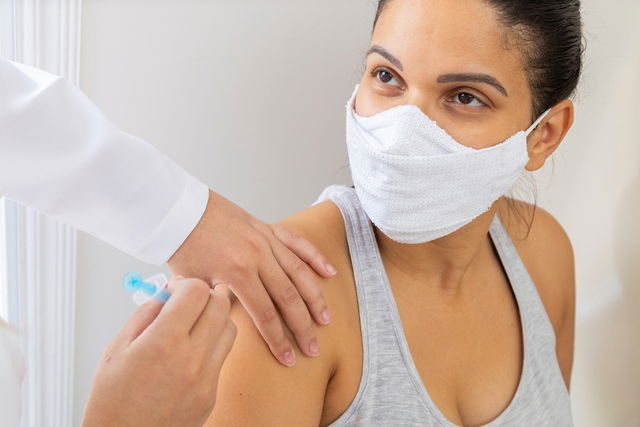Vaccine side effects, like headaches, fatigue and fever, may occur after injection of the COVID-19 vaccine. They are completely normal and tend to happen due to a natural immune system response.
The injection stimulates the immune system to produce antibodies to combat the substance that was injected. This response is what leads to COVID immunity, as the antibodies created will be the ones to fight the actual COVID-19 virus if it enters the body.
Some patients may experience serious reactions to the vaccine, which may present with a fever that lasts for over 3 days or significant arm swelling that does not resolve. These symptoms should be assessed by a doctor immediately, to rule out other possible causes.
Common side effects
Side-effects generally emerge 24 hours after injection. The most common ones are:
- Pain, swelling or redness at the injection site
- Headache
- Fever and chills
- Fatigue
- Muscular or joint pain
These reactions can last for 2 to 3 days. Symptoms like fever, headache and muscular pain are more commonly experienced after the second dose or a booster of the same vaccine (although pain and arm swelling can occur with all doses).

Vaccination is the best way to protect yourself from a serious infection of the COVID-19 virus. It should be completed despite the possible adverse reactions. Opting out of the vaccine means you will not experience side effects, but you will also not be protected against the coronavirus, and you will be at higher risk to developing a life-threatening injection.
How to treat vaccine reactions
Although vaccine reactions are usually mild and likely will not affect your day-to-day routine, there are some ways you can treat them:
1. Pain, swelling and redness at the injection site
To relieve these symptoms, you can apply a cold compress directly to the area for 10 to 15 minutes, several times throughout the day. This helps to reduce local inflammation and decrease discomfort.
It is also important to avoid any straining of the arm, like lifting weights, in the following 2 days.
2. Headache and fever
To relieve headache and fever, it is important to rest. There are some natural ways you can relieve a fever, like placing a towel with cold water on the forehead, avoid hot clothing or drinking ginger or valerian tea. Learn about other ways you can treat your headache naturally.
In addition, with guidance from a health care professional, you can take acetaminophen every 8 hours. This is an over-the-counter medication that reduces body temperature and helps to treat fever.
If your fever lasts for over 2 days or does not improve with medication, you should go to the hospital to identify the cause of the fever and start appropriate treatment as indicated.
3. Fatigue and muscular or joint pain
The best way to recover from fatigue and relieve muscular and/or joint pain is to rest as much as possible. You should avoid excess straining, like weight training, cleaning the house or exercising.
It is also important to drink plenty of fluids and maintain a healthy diet. Fluids you drink can be water, tea, coconut water or natural juices.
Possible serious reactions
Serious reactions to the COVID-19 vaccine are very rare, but occur mostly to people who have a history to reactions to other vaccines.
These reactions can occur soon after injection, or up to 4 weeks later:
- Serious allergic reaction, usually 30 minutes after injection
- Formation of clots that can lead to obstruction
- Heart inflammation
Although these are rare, you should identify a reaction as soon as possible to start correct treatment and avoid complications.
If you have symptoms like shortness of breath, facial swelling, an intense headache, chest pain or leg swelling, you should seek medical assistance immediately.
What causes vaccine reactions?
Reactions that emerge after a vaccination are a natural immune response to the subject that was infected. This substance depends on the type of vaccine, but it is usually a safe substance that can imitate the coronavirus to stimulate an immune response. When this happens, the body produces antibodies that will "wait" for the real coronavirus to enter the body.
It is common for reactions to be more intense after the second vaccine dose, as the body all has some back-up antibodies that were produced with the first dose. These antibodies will react much quicker and will be stronger when fighting the injected substance.
What does it mean if you do not have reactions to the vaccine?
Not having any reactions or just having mild side effects does not mean you will not achieve immunity against the virus. The intensity of reactions is related to each individual immune system, and not the type of immunity acquired.
The only way of knowing if you have or do not have immunity against COVID-19 is to complete an antibody blood test to check levels of IgG and IgM. Learn more about how COVID-19 can be tested.
When to go the hospital
It is imperative that you go to the hospital if you suspect a serious reaction to the vaccine. You should seek medical assistance if:
- You fever does not decrease or lasts for more than 3 days
- The arm swelling does not improve after 3 days
- You have other symptoms associated with COVID-19, like intense coughing, shortness of breath, or loss of smell
A vaccine cannot cause COVID-19. Some people, however, can come in contact with the virus just a few days before vaccination, and in these cases, the vaccine will not have been activated yet. Therefore, it is still possible to develop COVID-19. Vaccine efficacy is only guaranteed 14 days after the last dose.
